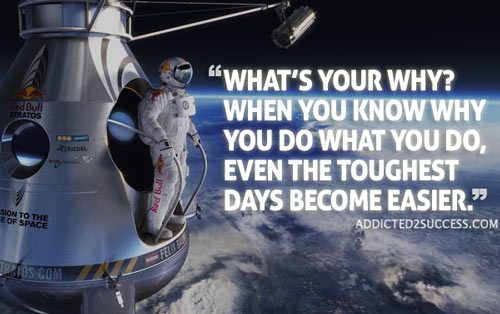Life
5 Keys to Discovering Your Ideal Life
How often do you hear “If I was retired I would do X, but I’m not retired yet, so it’s back to work Monday”? I hear this way too often, and you know what? If that’s your thought process you’re keeping it much too narrow.
There is no reason you can’t be living that ideal life now, before retirement. It just takes some intentional work to make it happen.
Here are five keys to figuring out your ideal life and making it happen:
1. What is your ideal life?
The first thing you need to do is know what your ideal life will look like. You won’t get there if you figure you’ll just know it when you see it. But the definition doesn’t have to be long and complicated. For me it’s having a business that allows me to spend much of my time in the mountains with my family.
You’re probably not going to come up with a statement like that on your first attempt. Really figuring out what your ideal life looks like takes months. You’ll most likely try on a few statements about your ideal life that you throw out because they’re not quite right.
To start designing it you need to ask yourself three questions:
- What is important to me?
- What activity leaves me with more energy than it takes?
- What is my purpose?
I knew that being a great father was important and that being out in the mountains gives me energy. Yesterday I spent nine hours hiking up a huge mountain and I have more energy for work today than I did any day last week. Once I really understood those two things I could start identifying the parts of my life that met my criteria for an ideal life.

2. What must be true for that to happen?
Once you know what your ideal life is like it’s time to figure out what needs to be true for that to happen. I know that to get to my ideal life I need a business model that’s one-to-many. I need to write a book or build a course and sell it to many people. Or I need to be doing more group coaching than one-on-one coaching. With a few truths about your business in hand you can evaluate your current business focus and decide what needs to get cut and what needs more time invested.
3. Define your systems
Systems are the lifeblood of any successful business. They’re the cleaning checklists or closing routines that ensure things happen at the right time and that you don’t forget anything. Most small business owners I talk to have no systems, and even if they do they often fail to use their systems. If you’re not using a system it may as well not exist.
The biggest net benefit in my business was building out my client vetting process. Having one standard email to send all prospects meant I had a simple, repeatable process that I could keep tweaking. When I hit a stumbling block in a project I could back track to my first emails and add in a question designed to tease out that stumble and either address it or ensure that I wouldn’t get that type of client again.
The second big benefit to systems is that you can get someone else to take them over. Once I had a defined email sequence for new clients and the answers I expected, I handed the initial few emails to my assistant which left me free to only deal with the prospects who were better qualified for my business.
4. Prepare for your season of hard work
It happens at every conference — someone asks me how I got my business to six figures in revenue. They ask because they want tips on how to get their business there as well. When I talk about making 10 contacts a day with new prospects, going to networking events, pitching other sites with content, working weekends and hard work in general, many tune out.
They didn’t really want to hear that reaching six figures required a bunch of work. They wanted some secret formula that would instantly produce success. They wanted the rewards without the work. That’s not how it works. If you want to get to your ideal life it’s likely going to take a season of hustle. You shouldn’t be working weekends for years, but doing so for six months, or even a year, as you get your ideal life business started is totally expected.
Even once you get going it’s likely you’ll have a few times when you’re going to need to hustle again to kick your business to the next level. Success is not effortless, it’s a product of hard work.
“When you live for a strong purpose, then hard work isn’t an option. It’s a necessity.” – Steve Pavlina
5. Take care of yourself and your relationships
As you’re on this journey and start to see some success it’s way too easy to just keep working harder. While it’s certainly true that hard work is the key to achieving your ideal life, doing so at the expense of your health or relationships with those around you yields a hollow success.
Those who fail to maintain a good balance risk looking back later at the aftermath of their success; children who won’t talk to them, a ruined marriage, poor health. They’re forced to ask themselves if all the money they’ve earned or ‘fame’ they’ve gained is really worth it.
It’s not! In the midst of working hard to design this ideal life and get it, make sure you take time out for the relationships you care about. Spend real time with your kids, without your phone to demand your attention. Date your partner. Take time to eat right and get some exercise.
You can have your ideal life. All you need to do is figure out what it is and then take intentional steps every day to get there.
What do you think is the most important key to discovering your ideal life?
Did You Know
How Skilled Migrants Are Building Successful Careers After Moving Countries
Behind every successful skilled migrant career is a mix of resilience, strategy, and navigating systems built for locals.

Moving to a new country for work is exciting, but it can also be unnerving. Skilled migrants leave behind familiar systems, networks, and support to pursue better job opportunities and a better future for their families. (more…)
Life
10 Research-Backed Steps to Create Real Change This New Year
This New Year could finally be the one where you break old patterns and create real, lasting change.

Every New Year, we make plans and set goals, but often repeat old patterns. (more…)
Life
9 Harsh Truths Every Young Man Must Face to Succeed in the Modern World
Before chasing success, every young man needs to face these 9 brutal realities shaping masculinity in the modern world.

Many young men today quietly battle depression, loneliness, and a sense of confusion about who they’re meant to be.
Some blame the lack of deep friendships or romantic relationships. Others feel lost in a digital world that often labels traditional masculinity as “toxic.”
But the truth is this: becoming a man in the modern age takes more than just surviving. It takes resilience, direction, and a willingness to grow even when no one’s watching.
Success doesn’t arrive by accident or luck. It’s built on discipline, sacrifice, and consistency.
Here are 9 harsh truths every young man should know if he wants to thrive, not just survive, in the digital age.
1. Never Use Your Illness as an Excuse
As Dr. Jordan B. Peterson often says, successful people don’t complain; they act.
Your illness, hardship, or struggle shouldn’t define your limits; it should define your motivation. Rest when you must, but always get back up and keep building your dreams. Motivation doesn’t appear magically. It comes after you take action.
Here are five key lessons I’ve learned from Dr. Peterson:
-
Learn to write clearly; clarity of thought makes you dangerous.
-
Read quality literature in your free time.
-
Nurture a strong relationship with your family.
-
Share your ideas publicly; your voice matters.
-
Become a “monster”, powerful, but disciplined enough to control it.
The best leaders and thinkers are grounded. They welcome criticism, adapt quickly, and keep moving forward no matter what.
2. You Can’t Please Everyone And That’s Okay
You don’t need a crowd of people to feel fulfilled. You need a few friends who genuinely accept you for who you are.
If your circle doesn’t bring out your best, it’s okay to walk away. Solitude can be a powerful teacher. It gives you space to understand what you truly want from life. Remember, successful men aren’t people-pleasers; they’re purpose-driven.
3. You Can Control the Process, Not the Outcome
Especially in creative work, writing, business, or content creation, you control effort, not results.
You might publish two articles a day, but you can’t dictate which one will go viral. Focus on mastery, not metrics. Many great writers toiled for years in obscurity before anyone noticed them. Rejection, criticism, and indifference are all part of the path.
The best creators focus on storytelling, not applause.
4. Rejection Is Never Personal
Rejection doesn’t mean you’re unworthy. It simply means your offer, idea, or timing didn’t align.
Every successful person has faced rejection repeatedly. What separates them is persistence and perspective. They see rejection as feedback, not failure. The faster you learn that truth, the faster you’ll grow.
5. Women Value Comfort and Security
Understanding women requires maturity and empathy.
Through books, lectures, and personal growth, I’ve learned that most women desire a man who is grounded, intelligent, confident, emotionally stable, and consistent. Some want humor, others intellect, but nearly all want to feel safe and supported.
Instead of chasing attention, work on self-improvement. Build competence and confidence, and the rest will follow naturally.
6. There’s No Such Thing as Failure, Only Lessons
A powerful lesson from Neuro-Linguistic Programming: failure only exists when you stop trying.
Every mistake brings data. Every setback builds wisdom. The most successful men aren’t fearless. They’ve simply learned to act despite fear.
Be proud of your scars. They’re proof you were brave enough to try.
7. Public Speaking Is an Art Form
Public speaking is one of the most valuable and underrated skills a man can master.
It’s not about perfection; it’s about connection. The best speakers tell stories, inspire confidence, and make people feel seen. They research deeply, speak honestly, and practice relentlessly.
If you can speak well, you can lead, sell, teach, and inspire. Start small, practice at work, in class, or even in front of a mirror, and watch your confidence skyrocket.
8. Teaching Is Leadership in Disguise
Great teachers are not just knowledgeable. They’re brave, compassionate, and disciplined.
Teaching forces you to articulate what you know, and in doing so, you master it at a deeper level. Whether you’re mentoring a peer, leading a team, or sharing insights online, teaching refines your purpose.
Lifelong learners become lifelong leaders.
9. Study Human Nature to Achieve Your Dreams
One of the toughest lessons to accept: most people are self-interested.
That’s not cynicism, it’s human nature. Understanding this helps you navigate relationships, business, and communication more effectively.
Everyone has a darker side, but successful people learn to channel theirs productively into discipline, creativity, and drive.
Psychology isn’t just theory; it’s a toolkit. Learn how people think, act, and decide, and you’ll know how to lead them, influence them, and even understand yourself better.
Final Thoughts
The digital age offers endless opportunities, but only to those who are willing to take responsibility, confront discomfort, and keep improving.
Becoming a man today means embracing the hard truths most avoid.
Because at the end of the day, success isn’t about luck. It’s about who you become when life tests you the most.
Change Your Mindset
The Four Types of Happiness: Which One Are You Living In?
Most people chase success only to find emptiness, this model reveals why true happiness lies somewhere else.

In a world driven by rapid technological growth and constant competition, many people unknowingly trade joy for achievement. (more…)
-

 Health & Fitness2 weeks ago
Health & Fitness2 weeks agoWhat Minimalism Actually Means for Your Wellness Choices
-

 News1 week ago
News1 week agoBrandon Willington Builds 7-Figure Business by Ignoring Almost Everything
-

 Did You Know2 weeks ago
Did You Know2 weeks agoWhy Most Online Courses Fail and How to Fix Them
-

 Business2 weeks ago
Business2 weeks agoIf Your Business Internet Keeps Letting You Down, Read This
-

 Business2 days ago
Business2 days agoEntrepreneur’s Guide to Pay Stubs: Why Freelancers and Small Business Owners Need a Smart Generator
-

 Finances4 hours ago
Finances4 hours agoWhy Financial Stress Is One of the Biggest Barriers to Personal Growth
-

 Business2 hours ago
Business2 hours agoThe Simple Security Stack Every Online Business Needs





















1 Comment